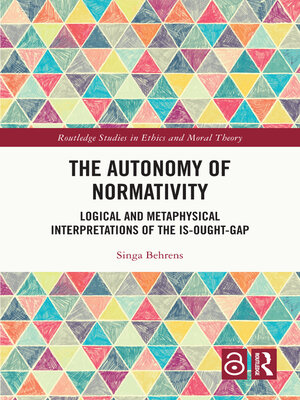The Autonomy of Normativity
ebook ∣ Logical and Metaphysical Interpretations of the Is-Ought-Gap · Routledge Studies in Ethics and Moral Theory
By Singa Behrens

Sign up to save your library
With an OverDrive account, you can save your favorite libraries for at-a-glance information about availability. Find out more about OverDrive accounts.
Find this title in Libby, the library reading app by OverDrive.



Search for a digital library with this title
Title found at these libraries:
| Library Name | Distance |
|---|---|
| Loading... |
While the Is-Ought Gap has recently been a topic of growing interest, most contributions are firmly fixed on logical, often quite technical accounts of the autonomy thesis. This book defends two complementary autonomy theses—a modal and ground-based thesis—that provide a deeper and more comprehensive understanding of the nature of normativity.
The autonomy thesis is often motivated by claims about the nature of the normative domain and its categorical difference from the non-normative domain. This book develops two novel interpretations of the autonomy thesis, one based on the notion of grounding and the other based on a notion of logical-semantic entailment, developed within a framework of truthmaker semantics. Together these accounts capture best the informal idea that we cannot 'get' something normative from the non-normative. The proposal is based on an analysis of what it means to say that certain propositional content parts are relevant to the instantiation of entailment and grounding relations. Moreover, the book relates the autonomy debate to other important metaethical debates, and it offers a more explicit account of the theoretical commitments of an autonomist position. Finally, it develops simple and elegant formal equivalents of the proposed autonomy theses which facilitate the evaluation of structurally complex proposed counterexamples, which have impeded a substantive autonomy debate.
The Autonomy of Normativity will appeal to researchers and graduate students working in metaethics, metaphysics, and philosophical logic.
The Open Access version of this book, available at www. taylorfrancis.com, has been made available under a Creative Commons Attribution-Non Commercial-No Derivatives (CC-BY-NC-ND) 4.0 International license. Funded by the Deutsche Forschungsgemeinschaft (German Research Council) through the Emmy-Noether Grant on Relevance (KR 4516/2-1), the European Research Council (ERC Grant 101040439, REASONS F1RST), and the Library of Bielefeld University.







